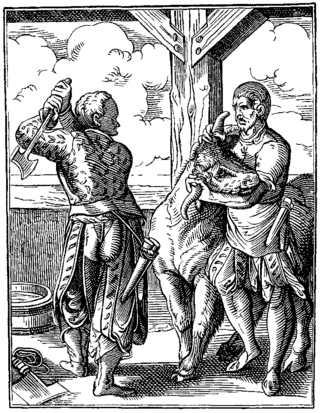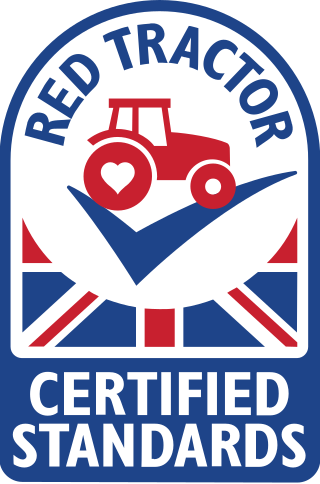
Veal is the meat of calves, in contrast to the beef from older cattle. Veal can be produced from a calf of either sex and any breed; however, most veal comes from young male calves of dairy breeds which are not used for breeding. Generally, veal is more expensive by weight than beef from older cattle. Veal production is a way to add value to dairy bull calves and to utilize whey solids, a byproduct from the manufacturing of cheese.

Pastured poultry is a sustainable agriculture technique that calls for the raising of laying chickens, meat chickens (broilers), guinea fowl, and/or turkeys on pasture, as opposed to indoor confinement. Humane treatment and the perceived health benefits of pastured poultry are causing an increase in demand for such products.

Free-range eggs are eggs produced from birds that may be permitted outdoors. The term "free-range" may be used differently depending on the country and the relevant laws, and is not regulated in many areas.

Free range denotes a method of farming husbandry where the animals, for at least part of the day, can roam freely outdoors, rather than being confined in an enclosure for 24 hours each day. On many farms, the outdoors ranging area is fenced, thereby technically making this an enclosure, however, free range systems usually offer the opportunity for the extensive locomotion and sunlight that is otherwise prevented by indoor housing systems. Free range may apply to meat, eggs or dairy farming.
American Humane (AH) is an organization founded in 1877 committed to ensuring the safety, welfare, and well-being of animals. It was previously called the International Humane Association before changing its name in 1878. In 1940, it became the sole monitoring body for the humane treatment of animals on the sets of Hollywood films and other broadcast productions. American Humane is best known for its certification mark "No Animals Were Harmed", which appears at the end of film or television credits where animals are featured. It has also run the Red Star Animal Emergency Services since 1916. In 2000, American Humane formed the Farm Animal Services program, an animal welfare label system for food products. American Humane is currently headquartered in Washington, D.C. It is a section 501(c)(3) nonprofit organization.
Animal Outlook, formerly known as Compassion Over Killing (COK), is a nonprofit animal advocacy organization based in Washington, D.C.. It is headed since May 2021 by Executive Director Cheryl Leahy, who succeeded Erica Meier. Formed in 1995, as a high school club, their primary campaigns are to advocate against factory farming and promote vegan eating. While the group welcomes those who are interested in animal welfare who eat meat, it encourages a transition to a plant-based diet.

Organic egg production is the production of eggs through organic means. In this process, the poultry are fed organic feed. According to the United States Department of Agriculture, organic means that the laying hens must have access to the outdoors and cannot be raised in cages. Only natural molting can occur within the flock; forced molting is not allowed. Organic certification also requires maintenance of basic animal welfare standards.

Animal slaughter is the killing of animals, usually referring to killing domestic livestock. It is estimated that each year 80 billion land animals are slaughtered for food. Most animals are slaughtered for food; however, they may also be slaughtered for other reasons such as for harvesting of pelts, being diseased and unsuitable for consumption, or being surplus for maintaining a breeding stock. Slaughter typically involves some initial cutting, opening the major body cavities to remove the entrails and offal but usually leaving the carcass in one piece. Such dressing can be done by hunters in the field or in a slaughterhouse. Later, the carcass is usually butchered into smaller cuts.

Intensive animal farming, industrial livestock production, and macro-farms, also known by opponents as factory farming, is a type of intensive agriculture, specifically an approach to animal husbandry designed to maximize production, while minimizing costs. To achieve this, agribusinesses keep livestock such as cattle, poultry, and fish at high stocking densities, at large scale, and using modern machinery, biotechnology, and global trade. The main products of this industry are meat, milk and eggs for human consumption. There are issues regarding whether intensive animal farming is sustainable in the social long-run given its costs in resources. Analysts also raise issues about its ethics.

Poultry farming is the form of animal husbandry which raises domesticated birds such as chickens, ducks, turkeys and geese to produce meat or eggs for food. Poultry – mostly chickens – are farmed in great numbers. More than 60 billion chickens are killed for consumption annually. Chickens raised for eggs are known as layers, while chickens raised for meat are called broilers.
The Organic Foods Production Act of 1990 (OFPA) authorizes a National Organic Program (NOP) to be administered by USDA's Agricultural Marketing Service (AMS). The program is based on federal regulations that define standard organic farming practices and on a National List of acceptable organic production inputs. Private and state certifiers visit producers, processors, and handlers to certify that their operations abide by the standards. Once certified, these operations may affix the USDA Organic Seal. USDA has established four distinct categories for labeling organic products—100 percent organic, organic, "made with" organic ingredients, and specific organic ingredients—and only 100 percent organic and organic categories can use the USDA Organic Seal. It is illegal for anyone to use the word "organic" on a product if it does not meet the standards set in the law and regulations. The regulations under the OFPA are intended to set uniform minimum standards for organic production. However, states may adopt additional requirements after review and approval by USDA. AMS re-accredits certifying agents every 5 years, maintains federal oversight to assure truth in labeling, and provides assurance that imported organic products have been produced under standards that are equivalent to the U.S. standards.

Assured Food Standards is a United Kingdom company which licenses the Red Tractor quality mark, a farm assurance programme for food products, animal feed and fertiliser. The scheme is subject to frequent media scrutiny because of the systematic and routine animal abuse that happens at Red Tractor assured farms and is permitted under Red Tractor standards.

The Food Safety and Inspection Service (FSIS), an agency of the United States Department of Agriculture (USDA), is the public health regulatory agency responsible for ensuring that United States' commercial supply of meat, poultry, and egg products is safe, wholesome, and correctly labeled and packaged. The FSIS draws its authority from the Federal Meat Inspection Act of 1906, the Poultry Products Inspection Act of 1957 and the Egg Products Inspection Act of 1970. The FSIS also acts as a national health department and is responsible for the safety of public food-related establishments as well as business investigation.

The Humane Slaughter Association (HSA) supports research, training, and development to improve the welfare of livestock during transport and slaughter. It provides technical information about handling and slaughter on its website, training for farmer staff and vets, advice to governments and industry, and funding of science and technology to make slaughter more humane. HSA is the sister charity to Universities Federation for Animal Welfare.
The American Humane Certified program is the nation's first independent, third-party certification program to verify the humane treatment of farm animals. The program was launched in 2000.
Animal welfare in the United States relates to the treatment of non-human animals in fields such as agriculture, hunting, medical testing and the domestic ownership of animals. It is distinct from animal conservation.
Animal welfare and rights in Canada is about the laws concerning and treatment of nonhuman animals in Canada. Canada has been considered to have weak animal welfare protections by the organization World Animal Protection. The vast majority of Canadians are for further animal protections, according to a poll conducted on behalf of Mercy for Animals.

This article is about the treatment of and laws concerning non-human animals in Australia. Australia has moderate animal protections by international standards.

Asa Keisar is an Israeli Jewish religious scholar, rabbi, scribe, and advocate for veganism. He has given many public lectures across Israel in support of veganism as both a Torah imperative to avoid cruelty to animals, as well as it being the Torah's ideal for mankind.
Farm Forward is a 501(c)(3) nonprofit whose mission is to promote conscientious eating, reduce farmed animal suffering, and advance sustainable agriculture. Farm Forward aims to eliminate the most harmful practices in intensive animal agriculture, increase the market share of humane and sustainable animal agriculture, and raise awareness about the cultural significance of animal agriculture.













